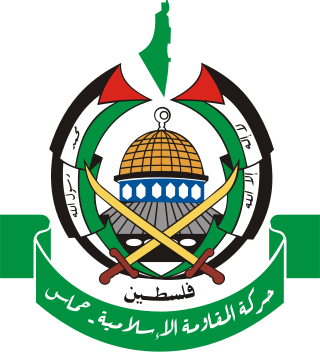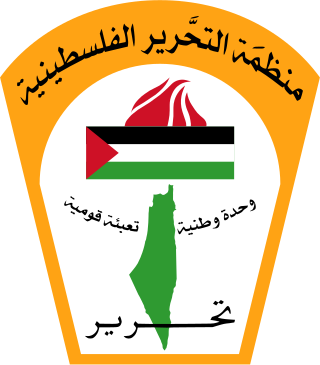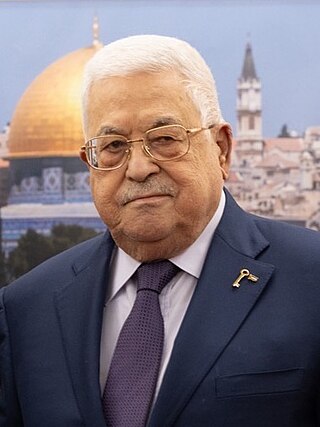Related Research Articles

Fatah, formally the Palestinian National Liberation Movement, is a Palestinian nationalist and social democratic political party. It is the largest faction of the confederated multi-party Palestine Liberation Organization (PLO) and the second-largest party in the Palestinian Legislative Council (PLC). Mahmoud Abbas, the President of the Palestinian Authority, is the chairman of Fatah.

Hamas, an acronym of its official name, Harakat al-Muqawama al-Islamiya, is a Palestinian Sunni Islamist political and military movement governing parts of the Israeli-occupied Gaza Strip since 2007.

The Palestinian Authority, officially known as the Palestinian National Authority or the State of Palestine, is the Fatah-controlled government body that exercises partial civil control over the Palestinian enclaves in the Israeli-occupied West Bank as a consequence of the 1993–1995 Oslo Accords. The Palestinian Authority controlled the Gaza Strip prior to the Palestinian elections of 2006 and the subsequent Gaza conflict between the Fatah and Hamas parties, when it lost control to Hamas; the PA continues to claim the Gaza Strip, although Hamas exercises de facto control. Since January 2013, the Palestinian Authority has used the name "State of Palestine" on official documents, although the United Nations continues to recognize the Palestinian Liberation Organization (PLO) as the "representative of the Palestinian people".

The Palestine Liberation Organization is a Palestinian nationalist coalition that is internationally recognized as the official representative of the Palestinian people. Founded in 1964, it initially sought to establish an Arab state over the entire territory of the former Mandatory Palestine, advocating the elimination of the State of Israel. However, in 1993, the PLO recognized Israeli sovereignty with the Oslo I Accord, and now only seeks Arab statehood in the Palestinian territories that have been militarily occupied by Israel since the 1967 Arab–Israeli War.
Palestinians hold a diverse range of views on the peace process with Israel, though the goal that unites them is the end of the Israeli occupation of the West Bank. Some Palestinians accept a two-state solution, with the West Bank and the Gaza Strip forming a distinct Palestinian state, whereas other Palestinians insist on a one-state solution with equal rights for all citizens whether they are Muslims, Christians or Jews. In this scenario, Palestinian refugees may be allowed to resettle the land they were forced to flee in the 1948 Palestinian expulsion and flight. However, widespread anti-Semitic sentiments in Palestinian society and Palestinian militancy have hindered the peace process.

Mahmoud Abbas, also known by the kunya Abu Mazen, is the president of the State of Palestine and the Palestinian National Authority (PNA). He has been the chairman of the Palestine Liberation Organization (PLO) since 2004, PNA president since January 2005, and State of Palestine president since May 2005. Abbas is also a member of the Fatah party and was elected chairman in 2009.

The roadmap for peace or road map for peace was a plan to resolve the Israeli–Palestinian conflict proposed by the Quartet on the Middle East: the United States, the European Union, Russia and the United Nations. The principles of the plan, originally drafted by U.S. Foreign Service Officer Donald Blome, were first outlined by U.S. President George W. Bush in a speech on 24 June 2002, in which he called for an independent Palestinian state living side by side with Israel in peace. A draft version from the Bush administration was published as early as 14 November 2002. The final text was released on 30 April 2003. The process reached a deadlock early in phase I and the plan was never implemented.

The government of Palestine is the government of the Palestinian Authority or State of Palestine. The Executive Committee of the Palestine Liberation Organization (EC) is the highest executive body of the Palestine Liberation Organization and acts as the government. Since June 2007, there have been two separate administrations in Palestine, one in the West Bank and the other in the Gaza Strip. The government on the West Bank was generally recognised as the Palestinian Authority Government. On the other hand, the government in the Gaza Strip claimed to be the legitimate government of the Palestinian Authority. Until June 2014, when the Palestinian Unity Government was formed, the government in the West Bank was the Fatah-dominated Palestinian government of 2013. In the Gaza Strip, the government was the Hamas government of 2012. Following two Fatah–Hamas Agreements in 2014, on 25 September 2014 Hamas agreed to let the PA Government resume control over the Gaza Strip and its border crossings with Egypt and Israel, but that agreement had broken down by June 2015, after President Abbas said the PA government was unable to operate in the Gaza Strip.

The Prisoners' Document, officially the National Conciliation Document of the Prisoners was written in May 2006 by Palestinian prisoners, who were being held in an Israeli jail. The five prisoners who took part in writing the Document were respectively affiliated with Fatah, Hamas, Islamic Jihad, the Popular Front for the Liberation of Palestine (PFLP), and the Democratic Front for the Liberation of Palestine (DFLP).

The Palestinian National Security Forces are the paramilitary security forces of the Palestinian National Authority. The name may either refer to all National Security Forces, including some special services but not including the Interior Security Forces, the Presidential Guard and General Intelligence, or refer to the main force within the National Security Forces. Since the signing of the Oslo Accords, these forces operate in areas controlled by the PNA. In 2003, the organizations were merged into the Palestinian Security Services.
The Palestinian Authority Government of March 2006, also known as the First Haniyeh Government, was a government of the Palestinian National Authority (PA), led by Ismail Haniyeh, that was sworn in on 29 March 2006 and was followed by the Palestinian unity government of 17 March 2007. On 25 January 2006, Hamas won the election for the Palestinian Legislative Council (PLC) with 44.4% of the vote vs Fatah's 41.4%, and its leader Haniyeh formed the government, which comprised mostly Hamas members as well as four independents, after Fatah and other factions had refused to form a government with Hamas. It was the first Hamas-led PA government in the Palestinian territories.
Ghāzi Hamad is a senior Hamas member. He formerly was chairman of the border crossings authority in the Gaza Strip and Deputy Foreign Minister in the Hamas government of 2012.

The Fatah–Hamas conflict is an ongoing political and strategic conflict between Fatah and Hamas, the two main Palestinian political parties in the Palestinian territories, leading to the Hamas takeover of the Gaza Strip in June 2007. The reconciliation process and unification of Hamas and Fatah administrations remains unfinalized and the situation is deemed a frozen conflict.

China–Palestine relations, also referred to as Sino–Palestinian relations, encompass the long bilateral relationship between China and Palestine dating back from the early years of the Cold War.

Shaul Mishal is Professor Emeritus of Political Science at Tel Aviv University. Mishal is Head of the Middle Eastern studies Program at IDC Herzliya, researcher of Arab and Palestinian politics who founded and directed the Center for the Study of Arab Society in Israel. Mishal authored and co-authored several books and numerous articles in subjects related to Arab and Islamic political cultures and Palestinian politics.

The president of the Palestinian National Authority is the highest-ranking political position in the Palestinian National Authority (PNA). The president appoints the prime minister of the Palestinian National Authority, who normally requires approval of the Palestinian Legislative Council, and who shares executive and administrative power with the president.

Ahmed Ali Mohammed Qurei, also known by his Arabic name kunyaAbu Alaa, was a Palestinian politician who served as the second Prime Minister of the Palestinian National Authority.

Ismail Haniyeh is a Palestinian politician who is widely considered to be the chief political leader of Hamas, which has governed the Gaza Strip since 2007. He is the current chairman of the Hamas Political Bureau. As of 2023, he lives in Qatar.

A series of attempts to resolve the hostility between Fatah and Hamas have been made since their 2006–2007 conflict and Hamas' subsequent takeover of the Gaza Strip.
Al-Watan was a weekly publication by Hamas until its closure in February 1996 after repeated pressure and suspensions by the Palestinian Authority.
References
- ↑ Knudsen, Are (2005). "Crescent and Sword: the Hamas enigma" (PDF). Third World Quarterly . 26 (8): 1373-1388. Retrieved 16 June 2024.
- ↑ "Ismail Haniyeh: the new top man within Hamas". Middle East Monitor . 2017-05-08. Retrieved 16 June 2024.
- ↑ Roy, Sara (2004-06-01). "Religious Nationalism and the Palestinian-Israeli Conflict: Examining Hamas and the Possibility of Reform". Chicago Journal of International Law. 5 (1). Retrieved 16 June 2024.
- 1 2 "Ghazi Hamad: Hamas has become more pragmatic". Al Jazeera English . 2004-10-14. Retrieved 16 June 2024.
- 1 2 "Abbas: Hamas planning W. Bank takeover". Jerusalem Post . 2007-10-28. Retrieved 16 June 2024.